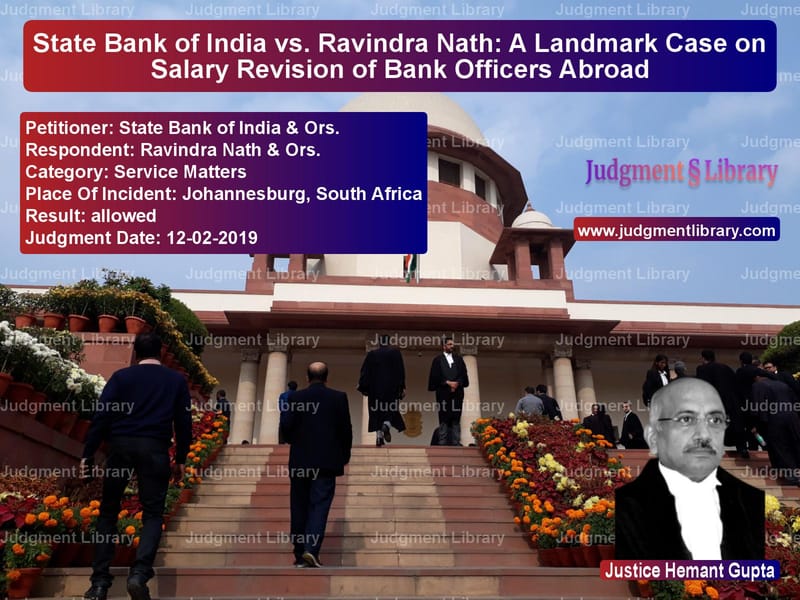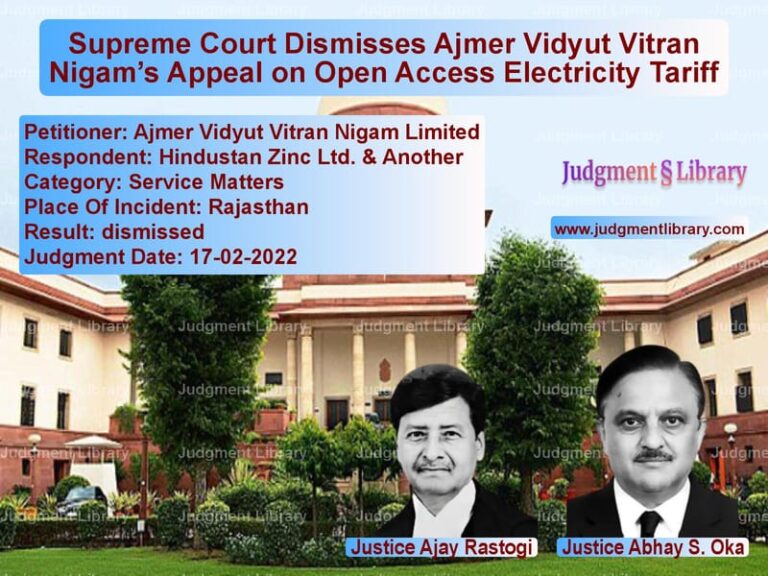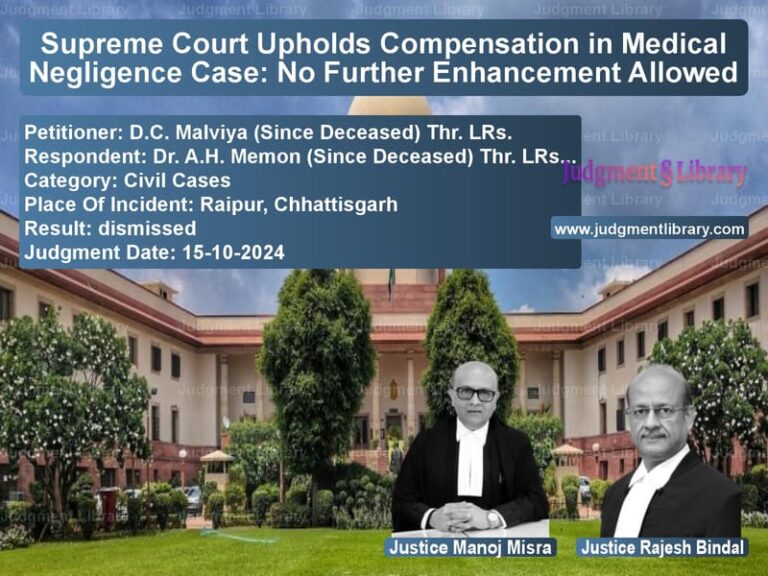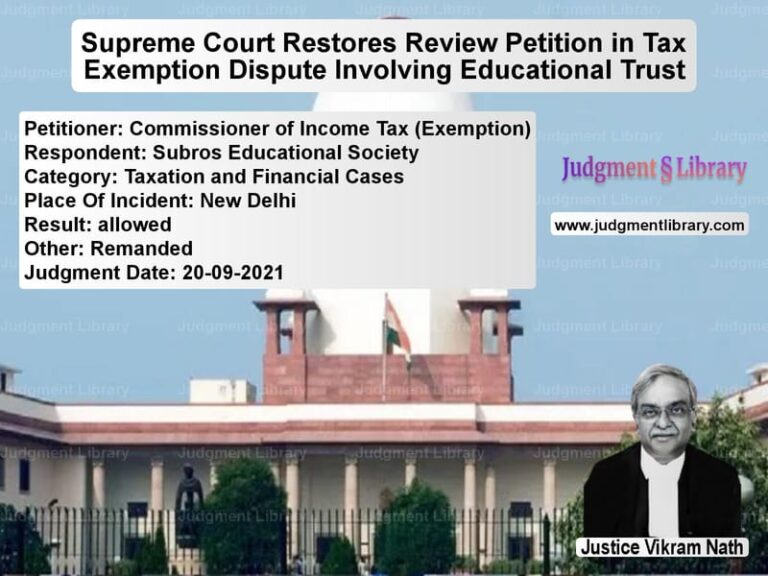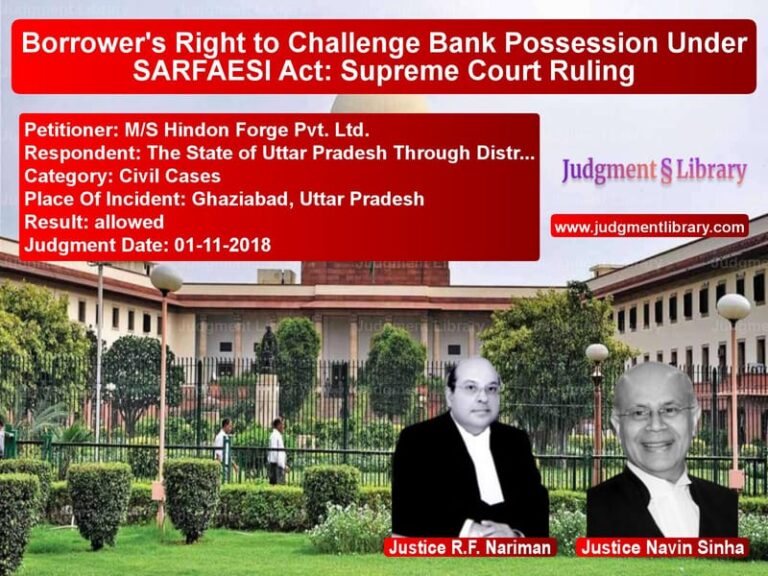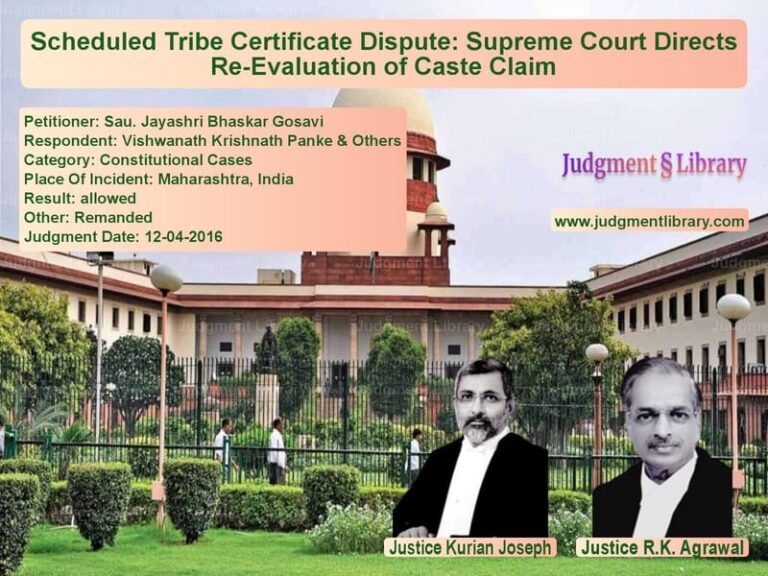State Bank of India vs. Ravindra Nath: A Landmark Case on Salary Revision of Bank Officers Abroad
The Supreme Court of India, in the case of State Bank of India & Ors. vs. Ravindra Nath & Ors., delivered a significant judgment regarding the salary revision of officers posted abroad by public sector banks. The case primarily revolved around the decision of the bank to revise the salary structure based on the Cost of Living Index, which was challenged by the respondent. This case is pivotal in defining the rights of employees in public sector undertakings and the discretionary powers of financial institutions in setting service conditions.
The respondent, an officer of the State Bank of India, was posted in Johannesburg, South Africa, as a Scale V officer. Initially, his salary was fixed at US $1965 per month with additional perquisites such as education allowances for children, a car for official use, medical reimbursements, and other benefits. However, as per the directives of the Standing Committee, the bank later revised his salary to US $1300, effective from January 1, 2001.
Background of the Case
The respondent joined the appellant bank in 1981 and was subsequently posted to Johannesburg in 2000. The salary structure provided to him was based on the Consumer Price Index of 1992 due to the unavailability of the Cost of Living Index at that time. However, in March 2000, the necessary index data became available, and the Working Group of the Standing Committee held a meeting on January 15, 2001, to realign salaries accordingly.
According to the revised structure:
- Scale I officers’ salaries were reduced from US $1615 to US $950.
- Scale V officers, including the respondent, saw their salaries drop from US $1965 to US $1300.
- Senior officers in the highest bracket had their salaries adjusted from US $2565 to US $1900.
Key Arguments by the Petitioner (State Bank of India)
The State Bank of India defended its decision by arguing that:
- The salary structure was always subject to revision, as clearly mentioned in the respondent’s appointment letter.
- The Standing Committee, which included government-appointed officials and representatives from various public sector banks, had the authority to fix salaries based on market conditions.
- All public sector bank officers posted abroad were affected by this revision; hence, it was not discriminatory.
- The respondent continued to receive substantial benefits such as perquisites worth Rs. 1,60,000 per month.
Key Arguments by the Respondent (Ravindra Nath)
The respondent challenged the reduction in salary on the following grounds:
- His initial appointment letter did not explicitly state that his salary could be reduced.
- There was no proper justification for implementing such a drastic reduction.
- The revised salary structure caused extreme hardship to officers posted abroad.
- He had relied on the initial salary package to make personal and financial commitments.
Judgment of the Supreme Court
Justice Hemant Gupta, delivering the judgment, upheld the decision of the State Bank of India and set aside the Bombay High Court’s ruling, which had been in favor of the respondent. The Supreme Court observed:
“Salary and perquisites granted to an officer posted abroad are subject to change from time to time, based on directives from the Standing Committee. The decision to revise the salary structure was made in a non-discriminatory manner and was applicable to all officers posted abroad.”
The court further noted that:
- The respondent continued to receive significant perquisites and benefits, which had not been altered.
- The salary was initially fixed in the absence of an updated Cost of Living Index, and adjustments were made once accurate data became available.
- Officers in similar positions in other public sector banks also had their salaries revised.
- The respondent had sought voluntary retirement while continuing to stay in Johannesburg, indicating that the revised salary did not cause substantial hardship.
Impact of the Judgment
This judgment is a landmark case in the domain of public sector employment and financial regulation. It establishes that:
- Public sector banks have the discretion to revise salary structures: Banks can modify compensation based on economic conditions and regulatory directives.
- Employees cannot claim a vested right to a particular salary: The Supreme Court made it clear that unless explicitly stated otherwise, employees must adhere to salary adjustments made by governing bodies.
- Non-discriminatory application of policies is key: The ruling confirmed that changes affecting all employees in a similar category cannot be deemed unfair or arbitrary.
- Judicial review is limited: The court reiterated that unless an employment decision is patently unfair or violates statutory provisions, judicial intervention should be minimal.
By dismissing the High Court’s decision and upholding the salary revision policy of public sector banks, the Supreme Court has reinforced the principle that financial institutions must have the flexibility to adjust compensation structures in response to economic conditions. This case serves as a precedent for similar disputes in the future.
Petitioner Name: State Bank of India & Ors..Respondent Name: Ravindra Nath & Ors..Judgment By: Justice Hemant Gupta.Place Of Incident: Johannesburg, South Africa.Judgment Date: 12-02-2019.
Don’t miss out on the full details! Download the complete judgment in PDF format below and gain valuable insights instantly!
Download Judgment: State Bank of India vs Ravindra Nath & Ors. Supreme Court of India Judgment Dated 12-02-2019.pdf
Direct Downlaod Judgment: Direct downlaod this Judgment
See all petitions in Employment Disputes
See all petitions in Public Sector Employees
See all petitions in Pension and Gratuity
See all petitions in Contractual Employment
See all petitions in Recruitment Policies
See all petitions in Judgment by Hemant Gupta
See all petitions in allowed
See all petitions in supreme court of India judgments February 2019
See all petitions in 2019 judgments
See all posts in Service Matters Category
See all allowed petitions in Service Matters Category
See all Dismissed petitions in Service Matters Category
See all partially allowed petitions in Service Matters Category

